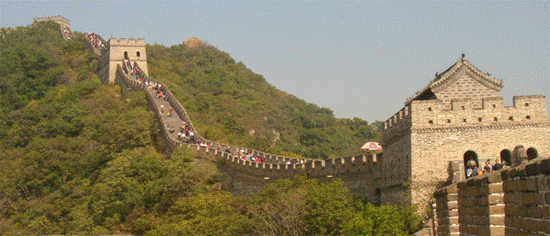And so we arrive in Tiananmen Square, the largest city square in the world and the site of the famous Tiananmen Square ‘Massacre”; but we must not speak of that! It is a very sensitive topic and Lisa certainly avoided any mention of it. It is an interesting coincidence that the protesters in Hong Kong are currently mounting a similar protest to Tiananmen about the absence of, or the threat of loss of, a democratic form of governance for their way of life. I would just make a couple of observations about these circumstances in a wider context.
It is indisputable that we in Australia enjoy the fruits of a remarkable democracy, one that is very different from the US, modelled on a Westminster system but idiosyncratic nevertheless, and different again from New Zealand, Germany and France. There are some problems with it, most notably it needs an election cycle over four or even five years, it needs better control over election funding sources, and an independent corruption body to keep the bastards honest. And when inevitably we grow up and become a Republic, some more adjustment will be required.
In Australia we have some very tame debates about left versus right ideology and both the major parties happily tread in each other’s territory when politically advantageous to do so. The Conservatives demand that Govt not interfere with the rights of the individual to manage their affairs but wholly support a universal health care system supported by Govt subsidy. The Progressives believe that Govt intervention is necessary to stimulate change in policy but turn to market forces for an ETS to manage carbon emissions while the Conservatives provide direct subsidy to electricity suppliers. Our democratic system uncomfortably straddles the barbwire fence of a centre left/right political system. We are pretty happy with it and even if our mob doesn’t get up this time, there will be no blood in the streets.
Now there was blood in the streets of Tiananmen Square all those years ago and more recently in Hong Kong. China is a Communist/Socialist Industrialised economy trading (for profit) with the rest of the World. It is authoritarian, but not like aggressive, nuclear Stalinist Russia after the Second World War. And, I ask you, how else might you manage the growth and development of such a huge emerging nation? How would a democratic government deal with issues like overpopulation, the rehousing and sanitation needs of its people, too many vehicles on its roads, pollution within its cities, transition from a fossil fuel to renewables industries? We in Australia are quick to criticise such an authoritarian regime, and we are right to point out our objections to the trammelling of human rights. But that too is a bit hypocritical given our inhumane treatment of refugees on Manus and Nauru.
The Forbidden city was the political and ritual centre of China over 500 years. After its completion in 1420, the Forbidden City was home to 24 Emperors, their families and servants during the Ming (1368-1644) and the Qing (1644-1911) dynasties. The last occupant (who was the last Emperor of imperial China), Puyi (1906-67), was expelled in 1925 when the precinct was transformed into the Palace Museum. Although it is no longer an imperial precinct, it remains one of the most important cultural heritage sites and the most visited museum in the People's Republic of China, with an average 80,000 visitors per day most of whom were present for our visit. My iPhone recorded we walked constantly for 6.9 kms on a very hot day with extreme humidity. It was quite a test on our first day.
The Forbidden city was the political and ritual centre of China over 500 years. After its completion in 1420, the Forbidden City was home to 24 Emperors, their families and servants during the Ming (1368-1644) and the Qing (1644-1911) dynasties. The last occupant (who was the last Emperor of imperial China), Puyi (1906-67), was expelled in 1925 when the precinct was transformed into the Palace Museum. Although it is no longer an imperial precinct, it remains one of the most important cultural heritage sites and the most visited museum in the People's Republic of China, with an average 80,000 visitors per day most of whom were present for our visit. My iPhone recorded we walked constantly for 6.9 kms on a very hot day with extreme humidity. It was quite a test on our first day.
Hong Kong represents another unfortunate remnant in the history of British colonisation, like India and Pakistan, like the Middle East, like Zimbabwe, like Canada and the Americas, like Australia. Imagine if the Emperor had allowed Zheng He to continue his journey with his mighty fleet around the Cape of Good Hope, across the Atlantic and on to the ‘New World’! They were more than capable of it. This, all before Columbus in his three puny ships ‘discovered’ the West Indies in 1492. The history of Western Civilisation as we know it would be completely changed: no forced colonisation of China, no Opium Wars, no British Hong Kong, no uprising in 2019 in Hong Kong demanding a separate democratic state. China imagines itself on the Long March; it is playing the long game. Each journey begins with a single step. China is patient. Trump is but an annoying speed bump along China’s inevitable belt and road project. They already own a port in Darwin.









No comments:
Post a Comment